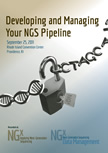CONFERENCE SERIES: Genomics
Recorded at: NGx: Applying Next-Generation Sequencing

 About this Product:
About this Product:
Managing and developing a successful NGS pipeline includes pre-sequence planning; experimental design, sample procurement, DNA/RNA sample preparation; the sequence platform runs; and post-sequence data analysis, management, and storage. NGS has revolutionized biological research but sequences cannot be accomplished without supporting technologies, managed resources, efficient workflows, and enthusiastic researchers. Learn from the practical experiences of experts who have developed their NGS pipelines for peak performance.
About this Product:
3 Presentations
Over 83 slides
115 minutes
Single Copy - $345.00
Site License - $1,380.00
Agenda At A Glance:
Next-Generation Sequencing and Its Impact on Clinical Practice: The Mayo Experience
 David Smith, Ph.D., Professor, Laboratory Medicine & Pathology, Mayo Clinic and Foundation
David Smith, Ph.D., Professor, Laboratory Medicine & Pathology, Mayo Clinic and Foundation
Biography: David I. Smith is currently a Professor in the Department of Laboratory Medicine and Pathology at the Mayo Clinic. He received his Ph.D. in Biochemistry from the University of Wisconsin in Madison in 1978. After completing post-doctoral studies at the Albert Einstein College of Medicine and the University of California, Irvine, he took his first faculty position at Wayne State University in the Department of Molecular Biology and Genetics in 1981. He is also the Chairman of the Technology Assessment Group for the Center for Individualized Medicine with the responsibility of evaluating new technologies for their potential impact on research and its' clinical translation. His laboratory works on two main projects. The first is the study of long non-coding transcripts to understand the important role that they play in cancer development. The second is to utilize the power of next-generation sequencing to better understand the molecular alterations that occur during the development of cancers of the head and neck.
Comparison of Commercially Available In-Solution Target Enrichment Methods for Next Generation Sequencing
Kip Lord Bodi, Genomics Core Director, Tufts University Core Facility, Tufts University School of Medicine
Biography: Kip Lord Bodi is currently the Director of the Genomics Core Service at Tufts University Core Facility. He earned his M.S. in Bioinformatics from Boston University and a B.A. in Computer Science from Colgate University, and is a computational biologist with 5 years of experience in bioinformatics and next-generation sequencing analysis. Kip has deep expertise and knowledge with many aspects of next-generation sequencing data analysis, including genome re-sequencing, whole transcriptome analysis, and ChIP-Seq. Kip is also a member of the DNA Sequencing Research Group (DSRG) of the Association of Biomolecular Resource Facilities.
Setting Up and Running Sequencers in Core Laboratories for the NCI
 Michael W. Smith, Ph.D., Vice President, Director, Genetics and Genomics Group, Advanced Technology Program, SAIC-Frederick, National Cancer Institute at Frederick
Michael W. Smith, Ph.D., Vice President, Director, Genetics and Genomics Group, Advanced Technology Program, SAIC-Frederick, National Cancer Institute at Frederick
Biography: Dr. Smith directs the Genetics and Genomics Group of SAIC-Frederick’s Advanced Technology Program. He provides scientific expertise and vision along with management oversight to the Laboratory of Molecular Technology and the Sequencing Facility. Dr. Smith earned a Ph.D. in genetics from the Johns Hopkins University and completed postdoctoral training in molecular genetics and evolution at the University of California, San Diego. Subsequently, he was the assistant director of the Human Genome Center at the Salk Institute for Biological Sciences and, most recently, a principal investigator in the Laboratory of Genomic Diversity (LGD) at NCI-Frederick studying HIV-1/AIDS, host genetics, and the genetics of other human diseases. Dr. Smith brought and implemented the high-throughput strategies of the genome project to the LGD, and was a key player in utilizing these approaches to successfully address the host genetics of HIV-1 infection and progression along with pioneering the development of the novel gene identification technique of admixture mapping. Dr. Smith has published over one hundred peer-reviewed publications.
About the Conference:
NGS platforms now generate terabytes of genomic data, calling into question: What is the best way to benefit from this data bonanza? CHI’s Next-Generation Sequencing Data Management combines unique perspectives from a variety of researchers, engineers, biostatisticians, and software developers involved with NGS data management. This team of scientists will present case studies creating a common ground on which to explore how best to store, transfer, and analyze NGS data sets with the common goal of turning data into knowledge.